Haters Gonna Hate
Recently, singer-songwriter Taylor Swift has had to shake off claims that she stole her lyrics for her famous 2014 hit single “Shake It Off.” Call it what you want, but Swift has caused some bad blood in the industry, and this isn’t the only time she has been accused of stealing lyrics; it’s an accusation she knows all too well.
In 2015, musician Jessie Braham claimed lyrics from “Shake It Off” were stolen from his song “Haters Gone Hate.” The case was dismissed on the grounds that the complaint didn’t rise above the speculative level. In September of 2017, songwriters Sean Hall and Nathan Butler claimed that Swift stole lyrics from their song “Playas Gon’ Play” (2001) for the girl group 3LW.
The chorus of that song includes the phrase, “Playas, they gonna play, and haters, they gonna hate.” Hall and Butler contested that Swift’s “Shake It Off” infringed on their lyrics with its chorus.
Swift’s lawyers’ end game is to have the case dismissed on the grounds that the concepts of players playing and haters hating are music phrases common enough to be considered public domain. Her lawyers have taken their point a step further by citing other famous songs that use the “player” and “hater” phrase, such as “Playa Hater” by the Notorious B.I.G., where the phrase “playa, playa hater” is used in the song’s chorus.
Between the Blurred Lines
Suits such as this one are anything but rare. In 2014, the family of late soul singer Marvin Gaye filed a suit alleging that Robin Thicke’s “Blurred Lines” infringed on Gaye’s 1977 hit “Got to Give It Up.”
In this particular case, studio arrangements were considered, including the song’s baseline, background noise, and even the cowbell. In its verdict, the court ruled that “Blurred Lines” mimicked the vibe of Gaye’s “Got to Give You Up.” This was something that had previously been beyond copyright protection, and which many fear sets a dangerous precedent. The jury found Robin Thicke and his co-writer Pharrell Williams guilty of unlawfully copying Gaye’s song and in the end were ordered to pay Gaye’s family $7.3 million along with 50 percent of the song’s future royalties. It was noted as one of the largest pay-outs in music copyright history.
Let’s take a look at copyright law and intellectual property in HeinOnline…ready for it?
Copyright Law in HeinOnline
The premise of copyright law was founded in the United States Constitution, which states that that Congress has the power to “promote the Progress of Science and useful Arts, by securing for limited Times to Authors and Inventors the exclusive Right to their respective Writings and Discoveries.”
To find the United States Constitution in HeinOnline, navigate to the catalog tab located at the top of any database in HeinOnline and type United States Constitution into the search field.

Copyright law is referenced in Article 1, Section 8, Clause 8.
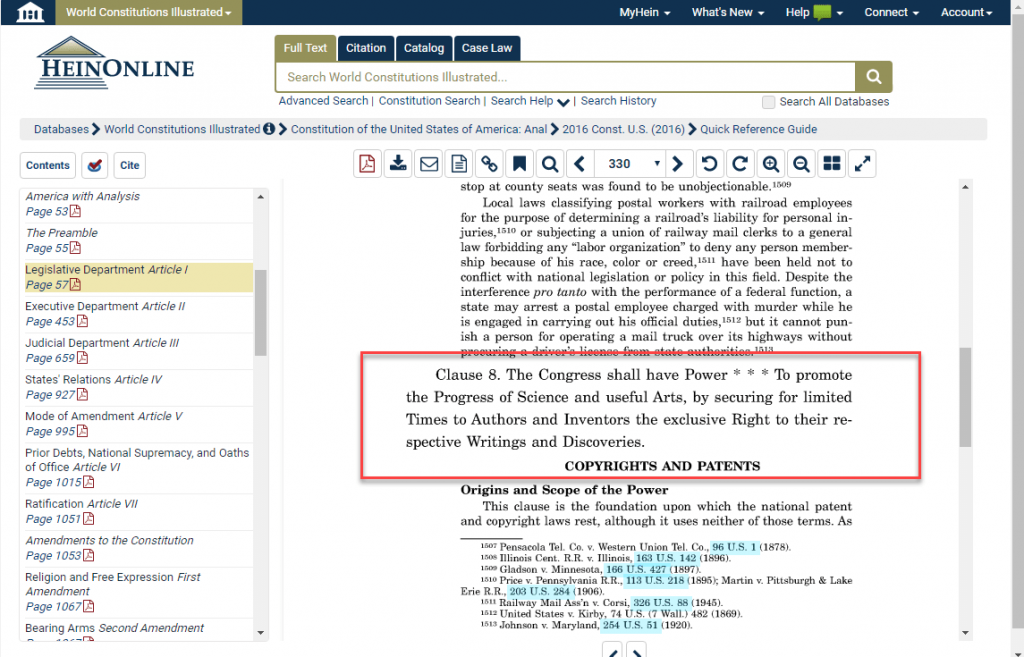
The Copyright Act of 1976 further explores the protection of creative works and expressions. There are a couple of ways to locate the legislative history of this Act in HeinOnline. Search for “P.L. 94-553” in the full-text search bar. You can narrow your results by collection, date, section type, and more.
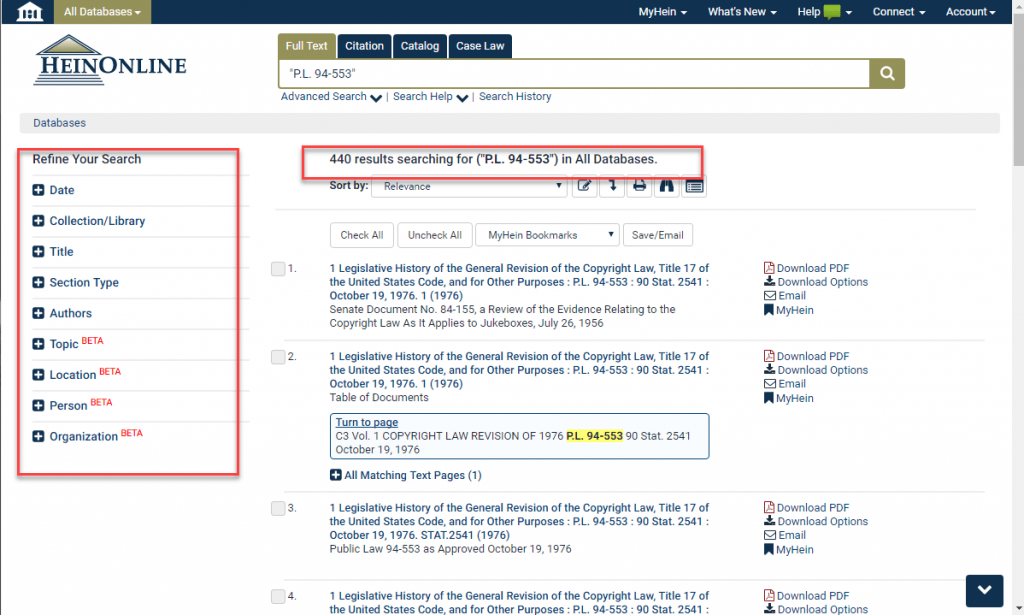
Inside of the U.S. Federal Legislative History Library, browse by Public Law, choose the 94th Congress, and navigate to P.L. 94-553 to view the legislative history.
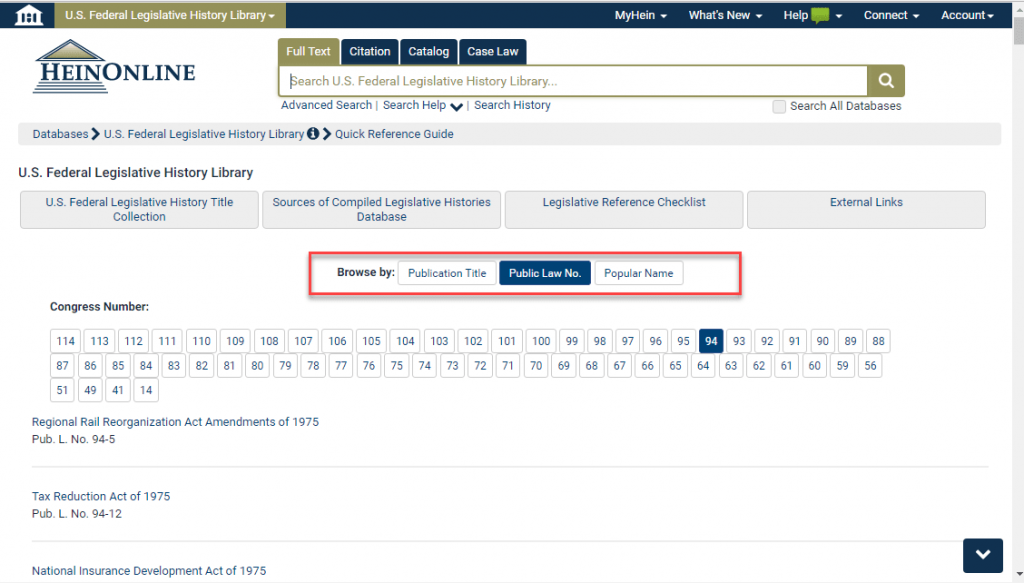
Intellectual Property Law Collection
With millions of pages of legislative histories, treatises, documents, classics, and more relating to copyrights, patents, and trademarks, this collection allows researchers to search across all intellectual property law materials in one database. Notable titles include: Legislative History of the 1909 Copyright Act (1976), Kamenstein Legislative History Project: A Compendium and Analytical Index of Materials Leading to the Copyright Act of 1976, and William Robinson’s Law of Patents for Useful Inventions.
To find the Legislative History of the 1909 Copyright Act in our Intellectual Property Law Collection, search for the phrase Legislative History of the 1909 Copyright Act using the Full Text tab on the main search bar.
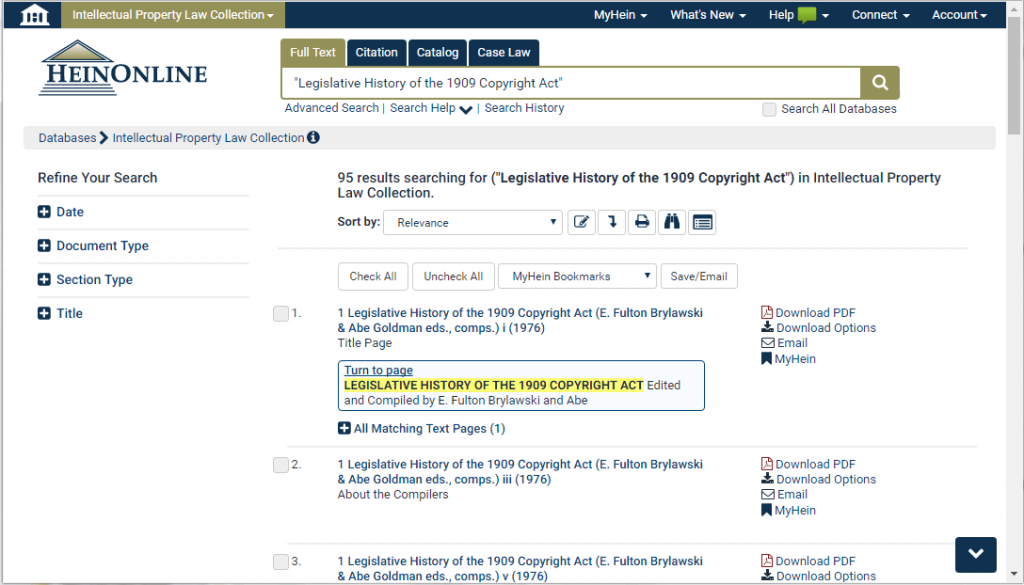
Browse by subject in HeinOnline’s Intellectual Property Law Collection by selecting Subject and navigating to subjects such as Copyright and Copyright Infringement for even more on copyright law.
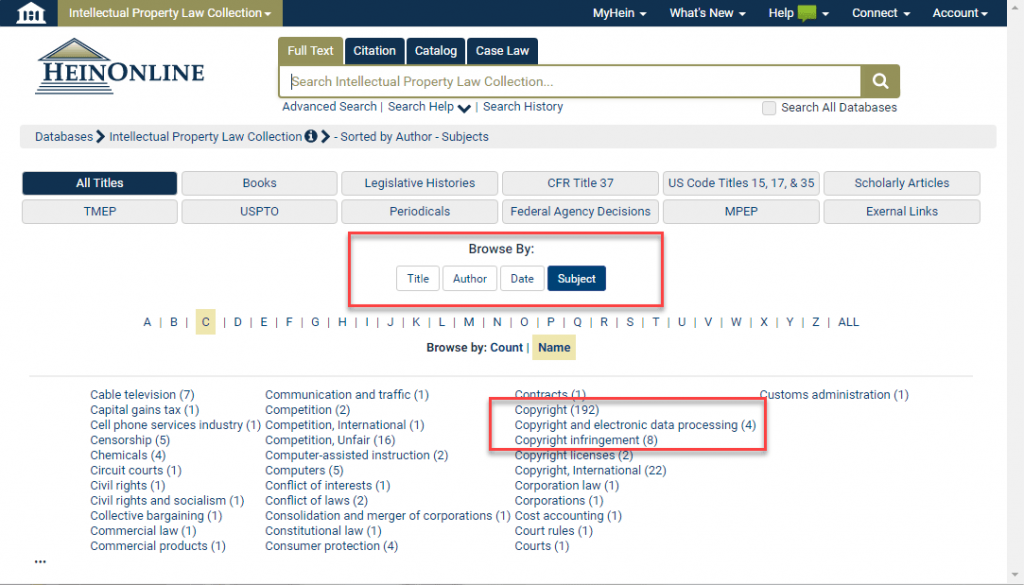
Law Journal Library & Copyright Law
To find articles written on this topic, search for “copyright law music”~10 in the Law Journal Library.

Within the results, use the Sort by option and choose Number of Times Cited by Articles.
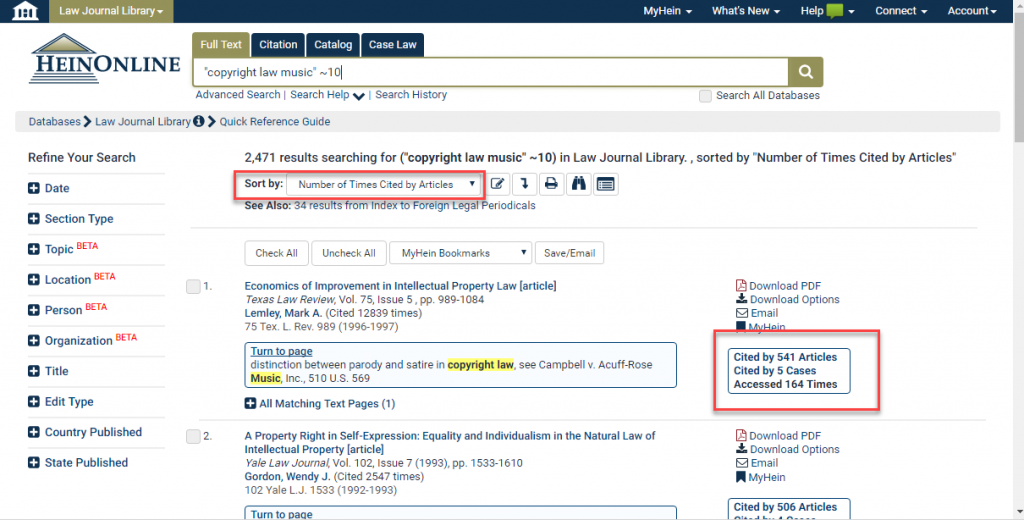
The first result, Economics of Improvement in Intellectual Property Law has been cited by more than 541 articles and 5 cases. These HeinOnline ScholarCheck links allow the user to view all of these options to see the most authoritative articles to help in their research.
Using the date field under Refine Your Search enter 2017. Here you’ll find the most recent articles on copyright law and music, including Copyright Law – Unique Characteristics of Music Warrant Its Own System: How Adopting the Intended Audience Test Can Save Music Copyright Litigation.
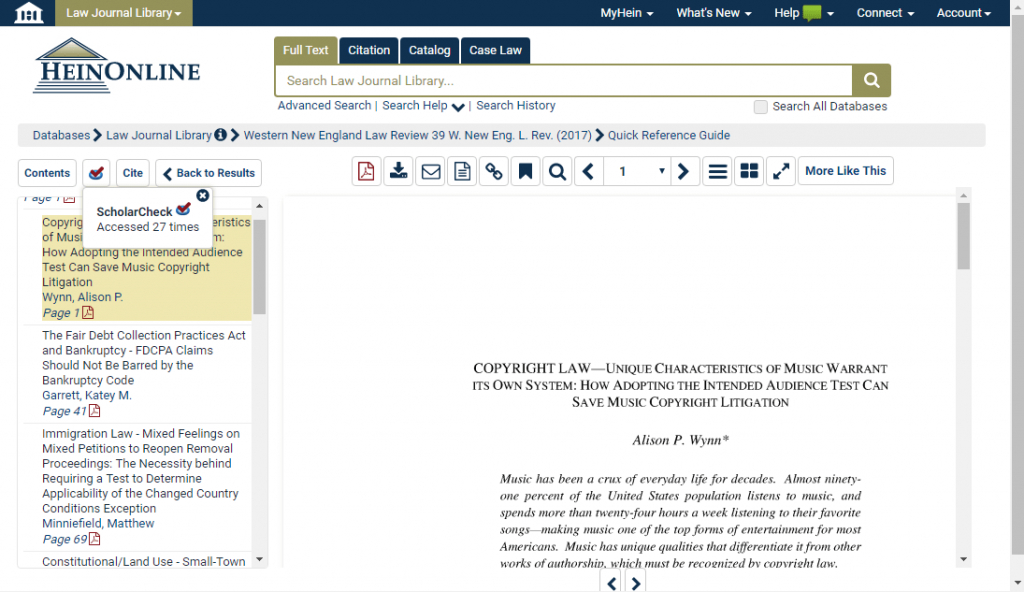
To find articles similar to this, click on the More Like This button to the right.
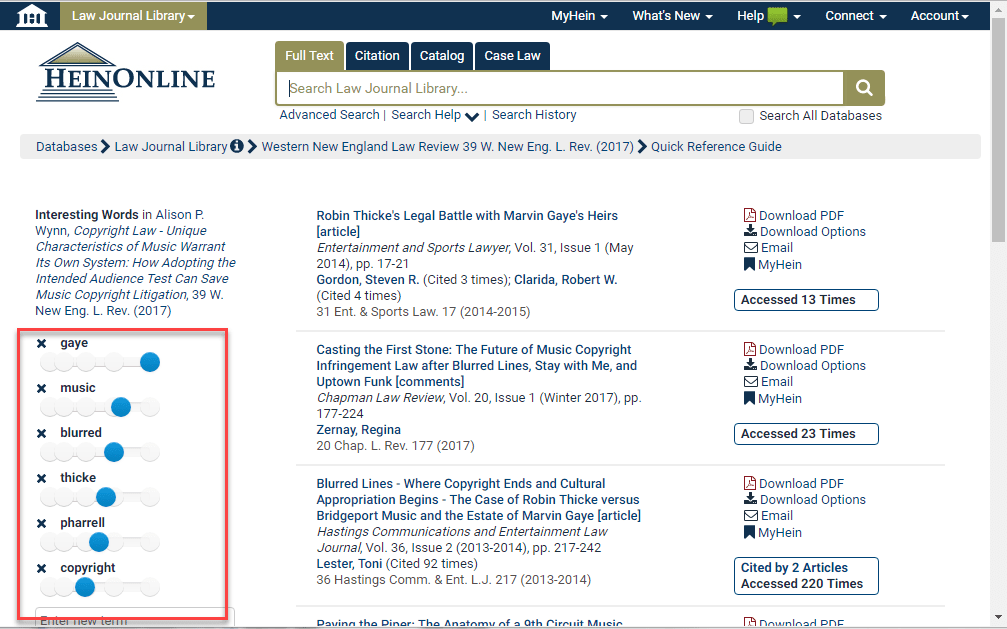
To alter your search, add more weight to terms such as Copyright and Music. Click on topics to find even more articles on various related topics such as intellectual property, arts and entertainment, and more.
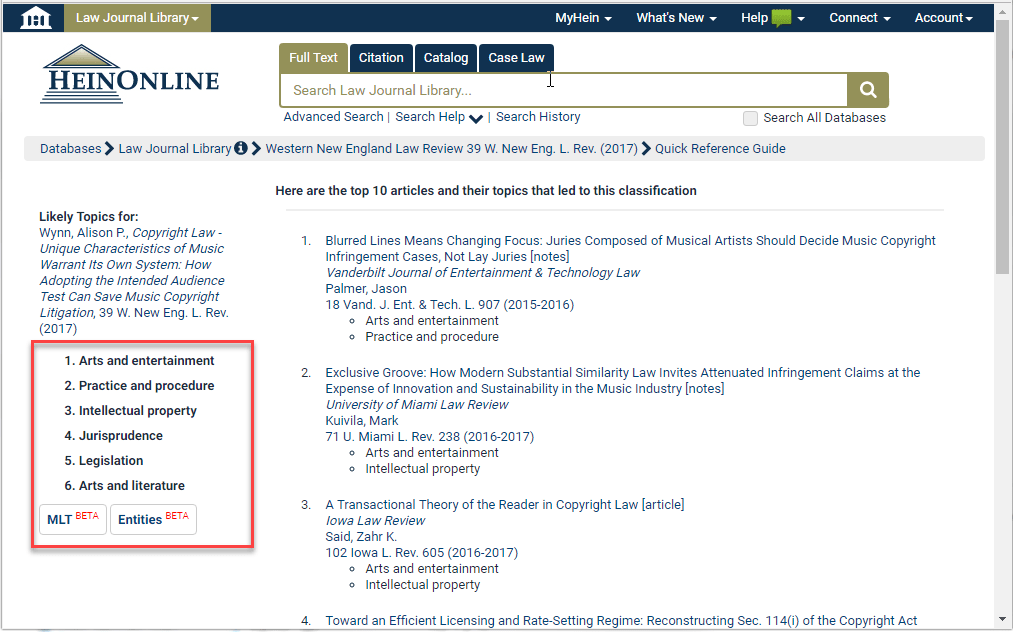
For help searching or navigating HeinOnline, contact the dedicated support team at (800) 277-6995, by email, or live chat!



